An empty badminton centre is an unusual place to find a boxer. But then Laisharam Sarita Devi is a boxer in an unusual position: she is a fighter who isn’t allowed to fight. It is the second week of July, and we are at the Balewadi Sports Stadium on the outskirts of Pune, where Sarita is training in solitary splendour in a hall off to one side of the badminton court. Outside, a monsoon breeze is blowing, and the sound of birds calling fill the air. Inside, Sarita is watched only by her personal trainer, physiotherapist, coach, two sparring partners, and a couple of reporters. There are two boxing rings on one side of the hall, with a pair of heavy punching bags rigged up in another corner. The far wall is lined with abandoned advertising boards promoting the now defunct Mumbai Fighters of the World Series of Boxing. Another sign says “Training Camp Season 2011-12 INDIA BOXING TEAM”, and a third says “Indian Boxing Federation” - the national sports federation that no longer exists. Somehow, it seems fitting that Sarita is training amidst this flotsam and jetsam. She is not, for the moment at least, part of boxing either. The silent building is a far cry from the raucous scenes at the Seonhak Gymnasium in Incheon, South Korea, where Sarita refused her bronze medal at the 2014 Asian Games last September. For her insubordination, the Amateur International Boxing Association (AIBA), the sport’s governing body, provisionally barred her from all competitions in late October before officially slapping her with a one-year ban in December. [caption id=“attachment_2447208” align=“alignleft” width=“380”] 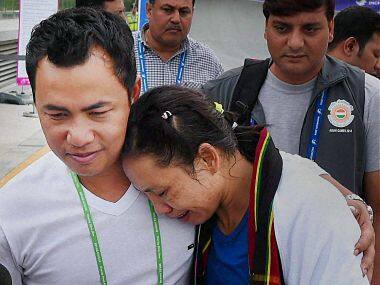 Sarita Devi is consoled by her husband Thoiba after losing her semi-final. PTI[/caption] The ban was the final blow of a traumatic episode that began with her losing the Asian Games lightweight (57 to 60 kg) semi-final to South Korean Park Ji Na in September. It cut her off from the sport that has been the guiding light of her life, and has been the most devastating set-back of her career. For those who watched the bout, there was no question Sarita was the winner. After the fight, Mary Kom said “There is no doubt that Park won because she is Korean. Sarita dominated the fight. These things happen, they happen all the time in boxing, but it is usually about 1-2 points. This was open cheating.” During the medal ceremony that followed, Sarita burst into tears when she saw the Indian flag. The crowd began chanting her name, and she stopped an official from putting the bronze medal around her neck. After some coaxing she took the medal in her hands, but seconds later walked over to Park and put the medal around her neck. For a moment, time stood still. Nobody quite understood what was happening – a professional athlete was having an emotional meltdown on live television. Park tried to give the medal back to Sarita, who took Park’s face in her hands tenderly, like a lover, and refused. Tears continued to stream down her face. It was heartbreaking to watch. Eventually, Sarita had to relent and take the medal back. However, in a final act of defiance, she left it on the podium after the ceremony was over. What most people don’t know, and what made the result so much harder to bear, was that Sarita had been fighting with a torn ligament in her right hand -, an injury she picked up in training ten days before the Commonwealth Games in July. Her trainer advised her to get MRI done and after scrutinizing the test results, the doctor told Sarita not to fight. It was not a situation she could accept. She called Viren Rasquinha, the CEO of Olympic Gold Quest (OGQ), a non-profit organisation that supports a number of India’s Olympic athletes, including Sarita. “He told me whatever you decide, I will support you. I took painkillers the night before the (first) fight. About 40 minutes before the fight I took painkillers again.” “In the first round, I was fine. But by the last round, I could not lift my arm. Because of the continuous fighting and the painkillers, I had nothing left.” Somehow Sarita managed to win a silver medal boxing with one arm (“to reach the final made me really happy”, she said). Rasquinha urged her to get the surgery done then, but with the Asian Games looming, Sarita was still having none of it. “I fought like this in the Asian Games also. I exercised for two months – icing after training, taping after training.” “Whatever my state is, I want to compete in the ring.” [caption id=“attachment_2447206” align=“alignleft” width=“380”] 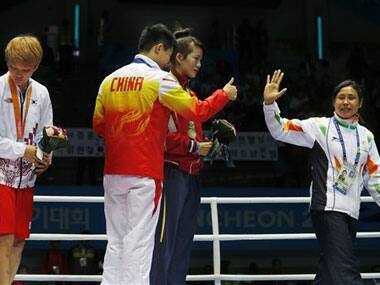 Sarita Devi refuses to accept her bronze medal at the 2014 Asian Games. AP[/caption] The full extent of Sarita’s injury was revealed only after she went under the knife at the Lilavati hospital in Mumbai in November last year. Dr. Sudhir Warrier, who performed the surgery, was stunned. Rasquinha said that “he told me ‘I don’t know how this lady has fought two major competitions in the span of one and a half months with this kind of hand. Every punch she would have thrown would have sent a shooting pain through her arm.’” If the physical pain wasn’t enough, there was the emotional sacrifice Sarita made as a new mother. She had a son - Tomthil - in 2013 but had to leave him behind with his father when it came time to train for the Commonwealth Games. Sarita’s weight had swelled to 85 kilos during the pregnancy and she needed to lose 25 kilos to make her fighting weight. She couldn’t do that and also care for her newborn child. For almost six months, she didn’t see her Tomthil. “I know for a fact that when she went home after winning the Commonwealth Games silver medal, her son, who was one year old at the time, did not even recognise her,” Rasquinha said. “So a combination of all this is what she went through and then she got a bad decision.” Is it any wonder she broke down during the medal ceremony? What followed was predictable. AIBA called for her head, claiming the protest was planned, disrespectful, and unsportsmanlike. “There will be zero-tolerance,” AIBA president CK Wu told The Associated Press, adding that “If everyone behaved like that, what type of competition will we have?” ‘An honest one’ would have been a candid answer, but irony has always been lost on sports administrators. Thoiba Singh, Sarita’s husband, defended her vigorously, saying “It is really disgusting. It is against the spirit of Olympic Boxing. Everyone should raise their voice against the world body.” In a just world, Sarita’s protest would have exposed the hypocrisy of AIBA and sports bodies everywhere that demand sportsmanship from the athletes without respecting it themselves (for other examples, see FIFA and the BCCI). In this world though, once emotions had cooled, it was Sarita who had to apologise unconditionally in order to avoid a life ban. Pradeep Aggarwal, a mental coach who has worked to toughen up the likes of golfer Anirban Lahiri and boxer Vijender, told me that athletes in Sarita’s position face two alternatives: they either come back stronger than before or they quit. There is no middle ground. “Sportspersons work with memories, and memories have an emotional context. This memory has a negative emotion. A lot of effort is required. Not only coming out of the trauma, but the expectations are high. It is not easy”. This, then, is the point on which Sarita’s boxing future balances. Yet something about Sarita’s story made Aggarwal feel she would overcome. “She is looking for revenge so chances are she will prepare herself fully. My gut feeling is that she will come back better than before.” Revenge is exactly the mentality Rasquinha wants her to have. He draws a comparison between Sarita’s situation and Novak Djokovic after he lost the 2015 French Open final to Stanislas Wawrinka. It was a crushing loss that prevented Djokovic from completing the career Grand Slam. But he picked himself up, dusted himself off and won Wimbledon two months later. “That is the best way to answer everyone,” Rasquinha said. “I told her to prove to everyone in the ring. Unfortunately, Sarita has to wait a lot longer to prove to everyone but we will prove to everyone.” “There will be many boxers who will pay because of what happened to her at the Asian Games.” [caption id=“attachment_2447216” align=“alignleft” width=“380”] 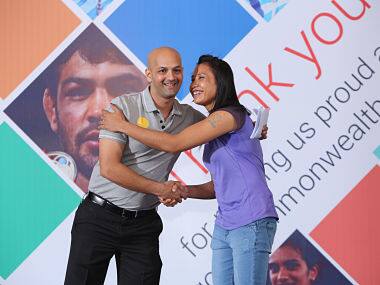 Sarita Devi with Viren Rasquinha at a recent OGQ promotional event. OCQ[/caption] Ironically, her protest also made her a household name in the way that her many medals had not. News channels were flooded with calls and Twitter streams overflowed with messages of support and encouragement. Even in her darkest hour, there was a glimmer of light. “I never thought even in my dreams that the country would support me the way it did, that people would stand with me, that they would fight for me” she says. “I got much happiness because of that. Then I wanted to do even better for my country.” When I meet her nine months on from the bout that everybody but the judges thought she had won, there is no discernible trace of bitterness or anger. Instead, there is a sense of lightness and quiet determination. “For me, what happened has become a driving force. It has given me a push to train,” Sarita says. Dressed in black tights and a dark blue sweatshirt over a long-sleeved bright orange t-shirt, Sarita looks fitter than ever. She began training in February in Bangalore working purely on her physical conditioning – her injured wrist was only cleared for punching in July – and it shows. Her body has the sleekness and tautness of a professional athlete, with only the smallest discernible bulge around her midsection. Akshay Hatkar, her strength and conditioning coach, says, “the paunch is irrelevant because there is a lot of muscle underneath.” Her training routine starts with her jogging multiple times around the room. This is followed by the whirr of the skipping rope, the only sound in the building, and then some shadow boxing. She concentrates on throwing combinations, watched closely by her coach, Lenin, who reminds her to be aware of her weight as it shifts from one leg to another. After a few minutes, she hits the heavy punching bag before it’s time to climb into the ring. While Sarita is sparring with her male partner, the electricity suddenly goes out. For a moment everyone freezes. Then, out of that blackness, her voice rings loud and clear: “Someone get a candle. My sparring partner has run away.” She laughs at her own joke and the rest of us crack up too. The simple act of getting into the ring has transformed her state of mind, like a cool wind blowing away the fog to reveal a bright blue sky. “My heart is in boxing. The first time I got into the ring, my mind just relaxed. I felt so happy.” She giggles as she says this, like a teenage girl talking about her latest crush. Only this has been a 15-year love affair. The sixth of eight children, Sarita was born in the town of Maytang Imphal in the state of Manipur. According to the 2001 census, her town had a population of a slightly more than 20,000 people, and female literacy was under 50 percent. When Sartia was growing up, opportunities, especially for women, were scarce. Her father, an Indian Oil Corporation employee, encouraged all his children to play sports after school because it offered a way out. L Ibomcha Singh, who has coached both Mary Kom and Sarita, told the Indian Express last year that “Sports provides an opportunity for a better life in a state where the unemployment rate is high and job options both limited and scarce. The families of these children know that if they do well then they will in all likelihood get good government jobs.” However, tragedy struck early. When she was 13, her father died. “We didn’t have any support,” she says. “My father had no brothers who could have helped us out. After he died, we were absolutely alone.” [caption id=“attachment_2447296” align=“alignleft” width=“380”]  File photo of Sarita Devi in the ring. PTI[/caption] Her mother was determined to keep her children in school, but Sarita felt she was not as academically inclined as some of her brothers and sister and did not want to be a burden. She had also begun working in the fields after her father died in order to help her mother, so there was little time for schoolwork. “My future did not lie in education. I would not have become anything.” She signed up for taekwando and kung fu training and even recalled winning gold in an age-group competition., A couple of years later, one of her coaches took them to a boxing camp at the Sports Authority of India training centre in Imphal. It was not love at first sight. “The first time I watched boxing, I got very scared. These boys were fighting in the ring and one of them was wearing red headgear. The red colour had mixed with the sweat. I thought he was bleeding.” A week later, Sarita went back and gave boxing another chance. The second impression was much better than the first. “I enjoyed the fighting. The running and training hard appealed to me.” She was 15 years old. Unlike most Indian families, Sarita’s mother supported her career choice from the get-go. “The good thing about Manipur is that they never try and stop daughters from doing what they want to do. Nobody says don’t do this or don’t try that.” Sticking with boxing was the hard part, though. Sarita was still a teenager and finding the money to fight was a constant source of worry. “Sometimes I would have no money for one or two months. I couldn’t tell anyone at home because I knew mom would do whatever she could to try and help me and life was already tough for her.” She would resort to odd jobs, sometimes with the help of her friends, and pool the money to pay her way. Results followed quickly. At the 2001 National Games Sarita won gold in her weight category. She also qualified for the first Asian Women’s Boxing Championship in the flyweight category the same year and made it all the way to the final before losing. The silver medal was her first taste of international success in the ring and it brought Sarita some measure of fame. “After I came home, a lot of people came to greet me. That motivated me even more,” she says. Two years later she was the best boxer in Asia at her weight, winning gold in Hisar and repeating the feat in 2005. But while boxing success came thick and fast, that government job remained elusive. So Sarita came to the reluctant conclusion that the 2005 World Championships would be glory’s last shot. If she won a medal, she would see it as a sign her future remained in boxing. If she didn’t, she would quit and get a job to support her family. She was still only 20 years old. Perhaps the universe felt her love of boxing should be rewarded. Perhaps it was karma. Or perhaps it was just good old fashioned hard work and determination, but Sarita got to the semifinals and picked up a bronze medal. Along with it came a cash reward from the government, and an even bigger prize - employment. Sarita was given a job with the Manipur police. “I would give half my salary to my family and with the other half – it wasn’t that I was comfortable – but I was able to do it,” she says. A year later, she won gold a year at the World Championships in New Delhi. It remains her only world title but over the years she has accumulated 10 other medals in a variety of international competitions, including four gold medals at the Asian Boxing Championships. [caption id=“attachment_2447328” align=“alignleft” width=“820”] 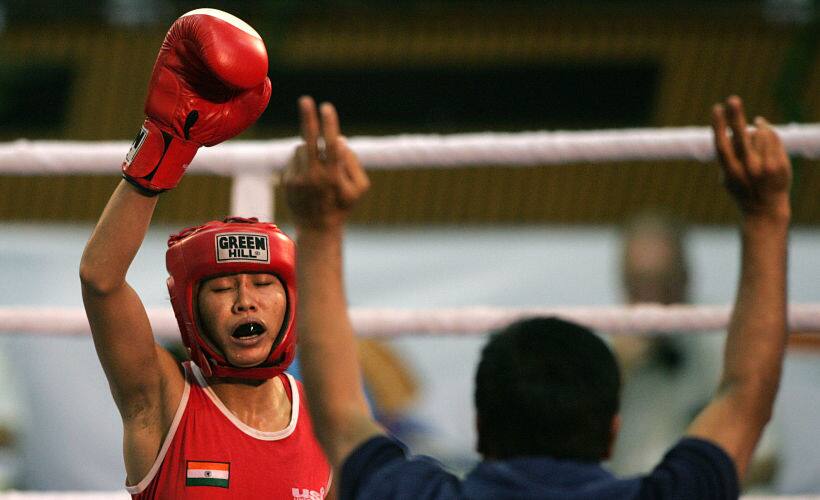 Sarita Devi (L) celebrates winning gold in the 52 Kg weight category at World Women Boxing Championship in New Delhi. AFP[/caption] There was one other time in her life when Sarita considered giving up boxing. It was right after she had her son in 2013. “I told my husband ‘I don’t know if I can get fit for the Commonwealth Games, if I can fight the way I used to fight,’” she says. “I was scared after the cesarean surgery. In boxing, you get punched a lot in the stomach. Will I be able to take it?” According to Sarita, her husband Thoiba encouraged her to keep going. She listened, trained, got fitter and realised she could still take a punch. “Thoiba tells me, ‘If you want to play until 40, play. There is no tension,” she says with a laugh. In the immediate aftermath after the chaos in Incheon, Sarita still hoped she would be forgiven as the country had rallied to her side. So much so that she was preparing for the World Championships in Jeju, South Korea in November. She and her family were at Delhi airport on their way to nationals when news of her provisional suspension came through. Thoiba got the news as he soon as he stepped off the plane but kept it to himself initially. Only after collecting the luggage, did he break it “very calmly”. “I became very sad and I sat down in the airport for a while to gather myself,” Sarita says. “It took me some time to get my mind under control.” The couple went to their hotel, called OGQ and made arrangements to go back to Manipur the next day. “We were told to go back,” Thobai told NDTV. “The media was hounding us and the federation officials advised that she should avoid the press.” But it would prove to be a turning point for Sarita. “I decided whatever was going to happen, would happen,” she says. “If I get the opportunity to play, I will play. If I don’t, I won’t. Doesn’t matter. Enough emotional turbulence had happened. It was time to distance myself from the situation.” Once the ban was in place, delaying the surgery any longer became pointless, so Sarita went under the knife. The first month of recovery at home was the toughest. Sarita still lives in Maytang - “I wanted to stay in my village and show the boys and girls that they don’t have to leave to do well in life” – and did her best to occupy herself. She helped with the housework, played with Tomthil and watched the Indian Super League. Sarita had apologised to AIBA and the India’s Sport Minister had appealed to boxing’s governing body to be lenient, but there was little indication of when AIBA would complete their investigation into her actions and make an official pronouncement.. She told the New Indian Express she had trouble sleeping and there were nights when she would wake up crying. “I thought once or twice about quitting,” she told me. “I felt enough was enough.” Thoiba comforted her by saying that God had been good to her in the past and would be good to her again. He pointed out that the ban meant she now had time to recover from her injuries and to spend with Tomthil. [caption id=“attachment_2447334” align=“alignleft” width=“380”] 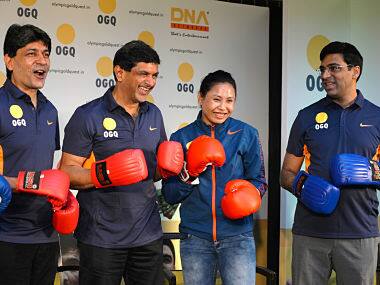 Sarita Devi with directors of Olympic Gold Quest (OGQ) Prakash Padukone Vishwanathan Anand and Geeth Sethi. AFP[/caption] Managing other family members was not as simple. One fallout of the Asian Games incident was that for the first time, Sarita’s mother was aware her daughter’s troubles. Sarita had always taken pains to shield her mother from her struggles, but since her protest was beamed across the world, her family had seen it. “More than me, she and my aunt were crying,” Sarita says. “They were not eating. I had to tell them don’t worry, this is nothing. Next time I will bring back the gold medal. You don’t take tension.” Sarita chuckles when she finishes the story. The absurdity of the situation appears to amuse her now, but I cannot imagine how she coped at the time; how she found the strength to deal not just with her sorrow but the sorrow of those around her too. It speaks to her stoicism and ability to deal with calamity without losing her sense of self. Through this all Sarita remained in the news. But constantly talking about her situation meant she wasn’t able to leave it behind. A few weeks after her surgery. Rasquinha says he told her the time had come to stop talking about the past. “‘You will lose all your goodwill and sympathy by cribbing and crying,’” he says he told her. “‘There should be no more discussion about it.’ She has kept her word. On her own, she doesn’t raise this issue any longer.” Sarita also received encouragement from an unexpected source. Sachin Tendulkar was very vocal in his support after the Asian Games, calling on India’s Sports Ministry and Boxing Association to stand by their athlete. Sarita would meet him at his home in Mumbai in January, collect a signed t-shirt and some vital words of comfort.
Met Sarita Devi. Could see the hunger for action in her eyes. pic.twitter.com/H3tcB9z3fa
— Sachin Tendulkar (@sachin_rt) January 15, 2015
“Whenever I do well in boxing, I will think of what he said. He told me, ‘As much sadness as the ring has given you, the same ring will give just as much happiness in the future. You have made your name because of this ring. You should remember this and train with this attitude.’” “It helped me deal with the sadness.” A few months ago Sarita was finally able to watch the video of her fight for the first time. She downloaded it on her phone because she “wanted to understand where I missed, what mistakes I made.” In telling the story, her voice drops to a whisper. She knows she won the fight, but she has forced herself to look at it more clinically, to analyse it like any other fight, to take away its power to hurt her and to convince herself that only performance counts. “I thought how did I fight? What can I learn from this? How much of a difference was there between us? Where did I miss my punches? How did she fight?”
But the dismal truth is boxing and fixing go together like ham and eggs. Two of the most egregious examples in recent history have taken place at the Olympics. At the 2012 Games in London, Japan’s Satoshi Shimizu knocked down Azerbaijan’s Magomed Abdulhamidov six times in the final round of their bantamweight bout. Yet the judges scored the round in favour of Abdulhamidov, who could barely stand, leading to massive outrage. “I was shocked by the final scores. He fell down so many times,” Shimizu said. “Why didn’t I win? I don’t understand.” Japan lodged a protest, and because the result was so outrageous, AIBA overturned the decision using the referee as the fall guy. A referee’s decisions can be appealed, the judges’ decision cannot be, which is why Sarita’s result could not be challenged. What made the result suspicious rather than a case of incompetence was that the BBC claimed to have uncovered a money-for-gold medals deal between AIBA and Azerbaijan in September 2011. “Whistleblowers say that WSB’s chief claimed the money was in return for a guarantee that Azerbaijani fighters would win two boxing gold medals at the London 2012 Olympics. The boxing organiser at the Olympics, AIBA, admits an Azeri national paid $9m (£5.9m) to one of their competitions. But they deny any deal to fix medals.” Fourteen years earlier at the 1998 Olympic Games in Seoul, Roy Jones Jr. - the US light middleweight and gold medal favourite - “suffered one of the Olympics’ worst injustices” as the Guardian put it. “Jones, barely bothering to raise his guard, landed 86 punches to Park Si-hun’s 32. The Korean took two standing eight counts and was twice warned by the referee. NBC’s Count-A-Punch recorder scored the rounds 20-3, 30-15 and 36-14 in Jones’s favour.” Yet Park was declared the winner. In 2004, Jones claimed he asked Park if the South Korean had won the fight. Park said no. Sarita, though, dismisses the notion that lightning could strike twice. “If I think negative, then I won’t be able to focus on my training,” she says. In the ring, Sarita is “working on a sense of distance; how to defend” – and so she is moving around the ring, ducking and weaving. A punch sails over her left shoulder and then her right as Lenin constantly shouts instructions to her. “Her offense is very good, but her counter is weak,” Lenin tells me. It is an assessment that Sarita agrees with, but the itch to throw a punch after so many months away from the ring is difficult not to scratch. “That is why coach kept telling me not to punch. I badly want to hit something,” she says. The purpose of all this training is to have Sarita in top shape when the time comes to qualify for the 2016 Olympic Games in Rio de Janeiro. “Whatever state I am in, I have to qualify for the Olympics and then win a medal. That is all I am thinking about,” she says with yet another giggle. It’s clear the prospect of fighting again has energised her and given her focus. She also makes it clear that when she says medal, she means a gold medal. “Olympic Gold is the focus. You must always focus high. If you focus on the gold and come up short, you might still get a medal. If you focus on any medal and come short, you get nothing.” Sarita missed the London Games in 2012, the first time women’s boxing was included in the Olympics, which is why she is desperate to make it to Rio next year. Since she turned 30 in March, it is likely to be her last chance to represent her country at the Olympic Games. Rasquinha and his team at OGQ have designed a fitness and training regimen for Sarita whose sole purpose is to ensure she will be the fittest boxer in the ring. “I can’t say that a ban is good, but having said that, given what has happened, we have utilized everything in a positive way.” Of course, all this requires still more sacrifice on Sarita’s part. Once again, she is away from her son. Thomthil stayed with her when she was rehabbing in Bangalore after surgery, but she wasn’t able to spend much time with him. She would leave early in the morning for training and when she got back, would be too tired to play with him. “He cries a lot whenever I leave. Says mama, tum mat jao [you don’t go]. But I need to keep him away from me if I want to achieve my goals.” she says. “I don’t want my mind to be cluttered.” [caption id=“attachment_2447356” align=“alignleft” width=“380”] 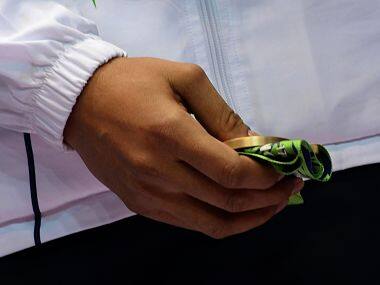 The medal. AFP[/caption] Tomthil, who is now two and about to start playschool, is once again growing confused about Sarita’s place in his life. On the phone that morning, she says he mixed up his grandmother and his mother and Sarita had to correct him. He doesn’t always want to talk to her either. “If he feels like talking, he does. Otherwise he doesn’t.” I ask her where her courage comes from. “I have had to struggle from a young age,” she says. “It is not an easy for life for us. In Manipur, everyone has to struggle. Everyone has some problem or the other. So we have lots of experience with struggles and we learn how to overcome them. “Sometimes I think about the struggles those in Manipur go through. The struggles my mother has gone through. And I think if I can win the gold medal, it will bring some joy to them and they might feel good.” Not all medals bring joy, though. At the time, Sarita said she wanted to leave her Asian Games bronze behind in Seoul because she wanted to leave the sadness behind with it. Where is the medal now? “The medal is with me in the house,” she says. “All my medals are in my house [in Maytang].” This particular medal isn’t kept with the rest of them though. She keeps it locked up in a separate cupboard. “Sometimes I open the almirah and look at it but then close it quickly,” she says. Then she pauses. “Otherwise the memories will come back.” And then she laughs again.


)

)
)
)
)
)
)
)
)



